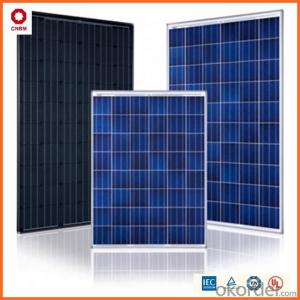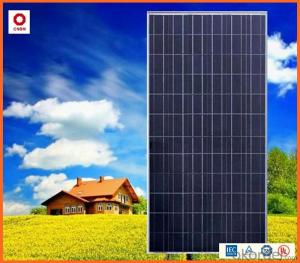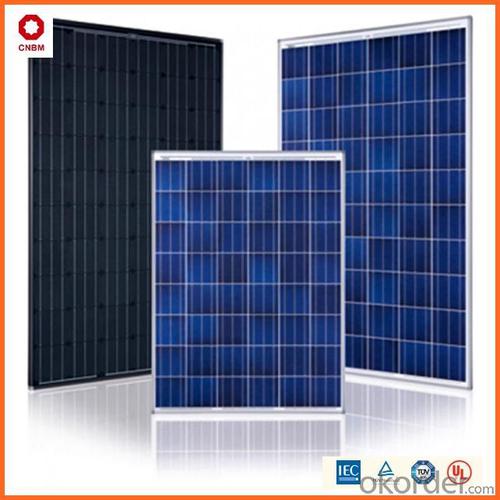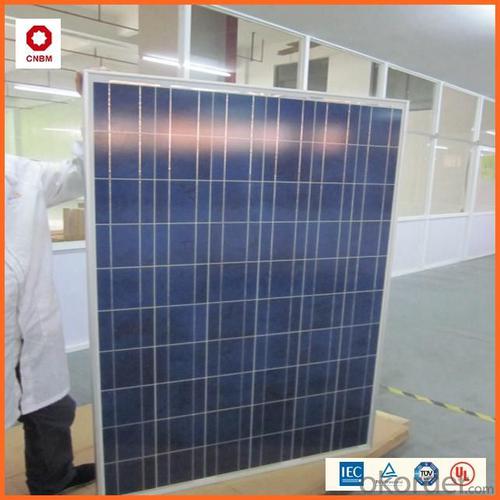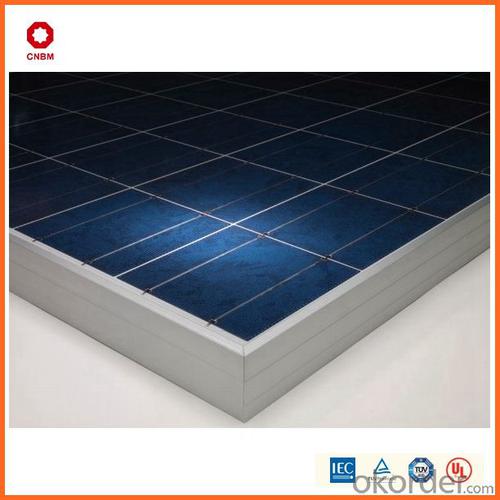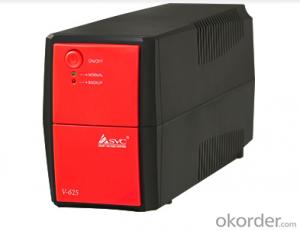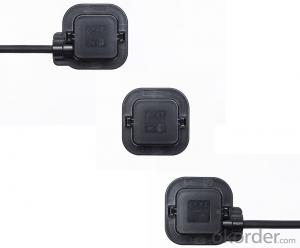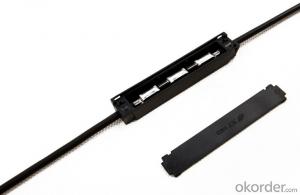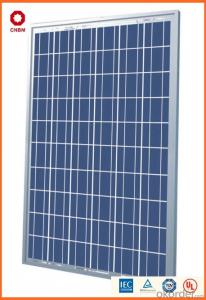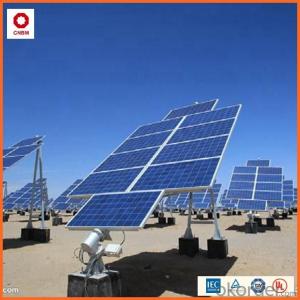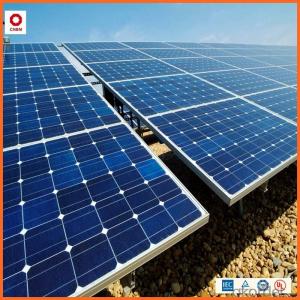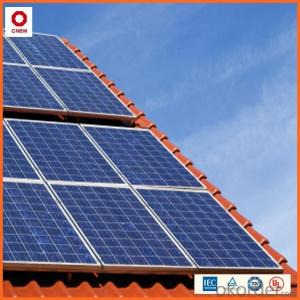Solar Energy Systems Spain ☆☆☆stock on sale 255w poly solar panel 0.45/w!!!!☆☆☆ a grade good quality
- Loading Port:
- China main port
- Payment Terms:
- TT OR LC
- Min Order Qty:
- 1 watt
- Supply Capability:
- 10000000 watt/month
OKorder Service Pledge
OKorder Financial Service
You Might Also Like
Product Description:
Hot Sale !!! Quality and Safety of 245w-320w Poly Solar Panel
1. Rigorous quality control meets the highest international standards.
2. High-transmissivity low-iron tempered glass, strong aluminium frame.
3. Using UV-resistant silicon.
4. IS09001/14001/CE/TUV/UL
Warranties of 245w-320w Poly Solar Panel
1. 10 years limited product warranty
2. 15 years at 90% of the minimal rated power output
3. 25 years at 80% of the minimal rated power output
Technical date of 245w-320w Poly Solar Panel
ITEM NO.: | Mono 125*125 cell ,36pcs . Power range from 80Wp-100Wp | ||||||||
Maximum Power(W) | 80 | 85 | 90 | 95 | 100 | ||||
Optimum Power Voltage(Vmp) | 17.81 | 17.89 | 17.94 | 17.99 | 18.06 | ||||
Optimum Operatige Current(Imp) | 4.78 | 4.91 | 5.12 | 5.35 | 5.59 | ||||
Open Circuit Voltage(Voc) | 21.98 | 22.05 | 22.14 | 22.28 | 22.45 | ||||
Short Circuit Current(Isc) | 4.95 | 5.15 | 5.36 | 5.65 | 5.84 | ||||
Solar Cell: | 125*125 Mono | ||||||||
Number of Cell(pcs) | 4*9 | ||||||||
Brand Name of Solar Cells | JA Cell, Bluesun Cell | ||||||||
Size of Module(mm) | 1580*808*35 | ||||||||
Caple & Connector Type | Pass the TUV Certificate | ||||||||
Frame(Material Corners,etc.) | Aluminium-alloy | ||||||||
Backing (Brand Type) | TPT | ||||||||
Cell Efficiency for 100W(%) | 15.8% | ||||||||
Weight Per Piece(KG) | 12.0KG | ||||||||
FF (%) | 70-76% | ||||||||
Junction Box Type | Pass the TUV Certificate | ||||||||
Tolerance Wattage(e.g.+/-5%) | ±3%, or 0-3% | ||||||||
Front Glass Thikness(mm) | 3.2 | ||||||||
Temperature Coefficients of Isc(%) | +0.04 | ||||||||
Temperature Coefficients of Voc(%) | -0.38 | ||||||||
Temperature Coefficients of Pm(%) | -0.47 | ||||||||
Temperature Coefficients of Im(%) | +0.04 | ||||||||
Temperature Coefficients of Vm(%) | -0.38 | ||||||||
Temperature Range | -40°C to +85°C | ||||||||
Surface Maximum Load Capacity | 2400Pa | ||||||||
Allowable Hail Load | 23m/s ,7.53g | ||||||||
Bypass Diode Rating(A) | 12 | ||||||||
Warranty | 90% of 10 years,80% of 25 years. | ||||||||
Standard Test Conditions | AM1.5 1000W/ 25 +/-2°C | ||||||||
Packing | carton or pallet | ||||||||
1*20' | 25 Pallets / 450pcs | ||||||||
1*40'STD | 25 Pallets / 100pcs | ||||||||
Features of our products:
• High conversion efficiency mono/poly-crystalline amorphous silicon solar cells
• Modules incorporate high performance bypass diodes to minimize the power drop caused by shading
• High transmittance, low-iron tempered glass
• High performance EVA encapsulant to prevent destroying and water.
• AI frame: without screw, corner connection. 8 holes on the frame can be installed easily
• Good performance of preventing from atrocious weather such as wind and hails
• Certifications: CE IEC TUV VDE UL, Class I
• 10 years 90% power output warranty

Shipping of 245w-320w Poly Solar Panel
By Sea | Delivery from Shanghai or Ningbo seaport |
By Air | Departure from Shanghai Pudong Airport |
By Express | Post by DHL, EMS, UPS, TNT. |
- Q: How do solar energy systems impact energy storage technologies?
- Solar energy systems have a significant impact on energy storage technologies by increasing the demand for efficient and scalable storage solutions. As solar power generation depends on sunlight availability, energy storage technologies help bridge the gap between peak solar production and peak energy demand, enabling a more reliable and flexible energy supply. This has spurred advancements in battery technology, grid-scale storage, and innovative storage solutions, ultimately driving the growth and integration of renewable energy sources into the grid.
- Q: What is the expected maintenance cost of a solar energy system?
- The maintenance cost of a solar energy system can differ depending on various factors. However, when compared to other methods of generating energy, the maintenance cost of a solar energy system is generally low. Solar panels, which are the crucial component of a solar energy system, are usually designed to be durable and require minimal maintenance. They are constructed to withstand different weather conditions and can last for many years with proper care. However, occasional maintenance may be necessary to ensure optimal performance. The maintenance requirements for a solar energy system typically involve cleaning the panels to remove any dirt, dust, or debris that may accumulate over time. This can be done by using water and a soft brush or with the assistance of automated cleaning systems. It is recommended to clean the panels at least once or twice a year, although this can vary depending on the location and environmental factors. Alongside cleaning, regular inspections of the solar energy system are also vital. This involves checking for any signs of damage, loose connections, or potential issues with the electrical wiring. Inspections can be carried out by the system owner or a professional solar installer, and they are generally done annually. On the whole, the expected maintenance cost of a solar energy system can be relatively low, typically ranging from 0.5% to 1% of the total installation cost per year. This cost mainly covers expenses for cleaning, inspections, and any minor repairs that may be necessary. However, it is important to note that the actual maintenance cost can vary depending on the system's size, location, and specific maintenance requirements. In conclusion, while there are some maintenance tasks associated with a solar energy system, the expected cost is generally low compared to other energy systems. With proper care and regular inspections, a solar energy system can continue to produce clean and renewable energy for many years with minimal maintenance expenses.
- Q: How do solar energy systems impact energy resilience during natural disasters?
- Solar energy systems can significantly enhance energy resilience during natural disasters. These systems provide a reliable and sustainable source of electricity, allowing essential services such as hospitals, emergency response centers, and water treatment plants to continue functioning even when the traditional power grid is disrupted. Solar panels can generate power independently, reducing the reliance on vulnerable fuel supply chains and reducing the risk of power outages. Moreover, solar energy systems can also contribute to the overall community resilience by providing power for charging essential devices, refrigeration of medicines, and lighting in homes, thus improving the well-being and safety of affected individuals during challenging times.
- Q: How do solar energy systems impact noise pollution?
- Solar energy systems have a minimal impact on noise pollution as they operate silently, without any moving parts or combustion. This makes them an ideal source of renewable energy, ensuring a quieter and more peaceful environment.
- Q: Can a solar energy system be used to power agricultural operations?
- Yes, a solar energy system can be used to power agricultural operations. Solar panels can be installed on agricultural buildings or in open fields to generate electricity. This renewable energy source can power various agricultural processes such as irrigation systems, livestock operations, and crop drying. Solar energy systems not only provide a sustainable and cost-effective power solution for agricultural operations but also reduce carbon emissions and dependence on fossil fuels.
- Q: Are there any insurance considerations for solar energy systems?
- Yes, there are several insurance considerations for solar energy systems. First and foremost, it is important to ensure that the solar energy system is adequately insured against damage or loss. This typically involves obtaining property insurance coverage that specifically includes the solar panels and related equipment. Additionally, liability insurance is also crucial for solar energy systems. This type of insurance protects against any damages or injuries that may occur as a result of the solar energy system, such as a panel falling and causing property damage or personal injury. Liability coverage should be sufficient to cover potential risks and liabilities associated with the installation, operation, and maintenance of the system. It is also important to consider business interruption insurance. This type of coverage can provide financial protection in the event that the solar energy system becomes damaged or malfunctions, resulting in a loss of power production and revenue. Business interruption insurance can help to cover the costs of repairs, replacement equipment, and any lost income during the downtime. Finally, it is advisable to consult with an insurance professional who specializes in renewable energy systems to ensure that all potential risks and exposures are properly covered. They can assist in identifying any additional insurance considerations specific to the solar energy system and provide guidance on the appropriate types and levels of coverage needed to adequately protect the investment.
- Q: How often do solar energy systems need to be cleaned?
- Solar energy systems typically need to be cleaned once or twice a year, depending on the location and environmental factors. Regular cleaning helps maintain their efficiency and ensures optimal performance.
- Q: How do solar energy systems impact the reduction of nuclear power reliance?
- Solar energy systems can have a significant impact on reducing reliance on nuclear power by providing a clean and renewable alternative. As solar power becomes more accessible and affordable, it can help decrease the need for nuclear power plants, which often pose environmental and safety concerns. Additionally, solar energy systems can decentralize power generation, allowing individuals and communities to generate their own electricity and reduce their dependence on centralized nuclear facilities.
- Q: I usually have to use about 10 degrees, more in the summer! Winter sunshine time 10 hours! Who knows how much a set price, what brand?
- Sold to the power supply bureau 0.45 yuan once, the state subsidy fee of $0.42, a year issued 3000 kwh.
- Q: Can solar energy systems be used for powering telecommunications infrastructure?
- Yes, solar energy systems can be used to power telecommunications infrastructure. Solar panels can be installed on rooftops or in open spaces to harness sunlight and convert it into electricity. This renewable energy can then be used to power communication towers, equipment, and other telecommunications infrastructure, providing a sustainable and reliable energy source. Additionally, solar energy systems can be combined with battery storage solutions to ensure uninterrupted power supply even during periods of low sunlight or at night.
Send your message to us
Solar Energy Systems Spain ☆☆☆stock on sale 255w poly solar panel 0.45/w!!!!☆☆☆ a grade good quality
- Loading Port:
- China main port
- Payment Terms:
- TT OR LC
- Min Order Qty:
- 1 watt
- Supply Capability:
- 10000000 watt/month
OKorder Service Pledge
OKorder Financial Service
Similar products
Hot products
Hot Searches
Related keywords
